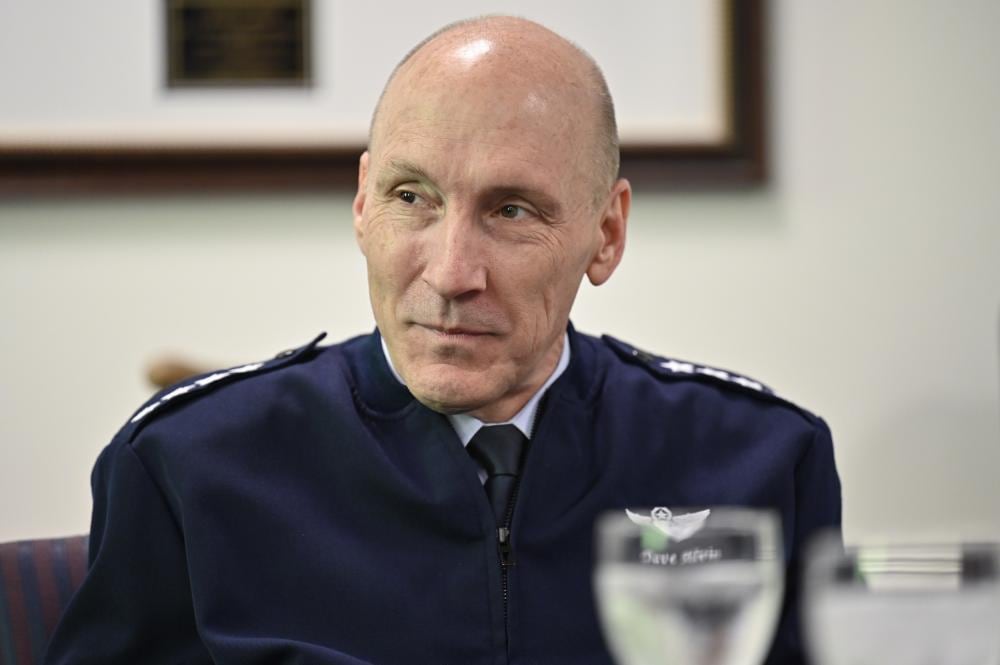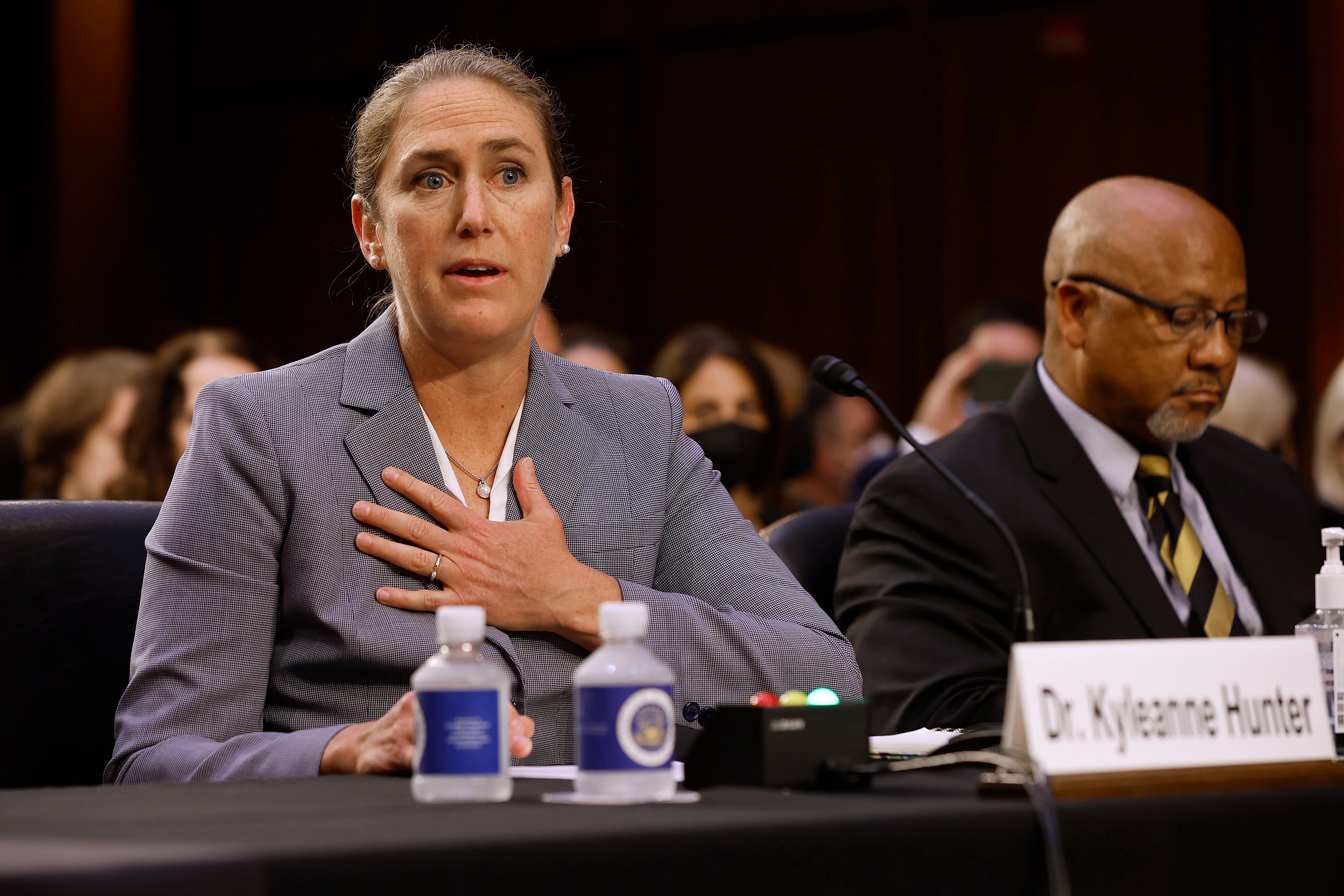This story was updated to include new information from the Air Force.
The Senate confirmed Gen. David Allvin to lead the Air Force in a 95-1 vote Thursday during a reprieve from a monthslong struggle on Capitol Hill to install the military’s top brass.
He was sworn in the same day, in the spot where he took his commissioning oath 37 years ago: the press box at the U.S. Air Force Academy’s Falcon Stadium in Colorado.
“It is truly an honor to be confirmed as the 23rd Chief of Staff of the Air Force,” Allvin said in an emailed statement. “My wife, Gina, and I are humbled by this opportunity, and we are eager to continue to serve our Air Force, our airmen and their families.”
RELATED

The Air Force has spent more than a month without a confirmed four-star general at the helm. Allvin, who became Air Force vice chief of staff since November 2020, has filled in as its acting chief since the previous leader, Gen. CQ Brown, was sworn in as chairman of the Joint Chiefs of Staff on Sept. 29.
He assumes the top job in the midst of a massive paradigm shift to prepare airmen and equipment for a new era of conflict. He also becomes the Air Force’s most senior officer as the U.S. rushes troops to the Middle East in the wake of a new war between U.S. ally Israel and the Palestinian militant group Hamas.
President Joe Biden chose Allvin to lead the Air Force in July, tapping the longtime mobility pilot and military strategist over candidates like U.S. Transportation Command boss Gen. Jacqueline Van Ovost and Pacific Air Forces Commander Gen. Kenneth Wilsbach.
Colleagues and outside experts have described him as a well-read, professorial leader with the self-discipline and Washington know-how to make an impact.
“Gen. Dave Allvin is the right leader for this defining decade, as our Air Force continues to adapt to the evolving global security environment, and ensure we have the culture, concepts and capabilities needed to compete and win in a highly contested environment,” Brown said in an Air Force release in July. “His expertise in strategy and planning will be crucial to the service’s success in this era of sustained strength and deterrence.”
As head of the third-largest branch of the armed forces, Allvin will manage a $180 billion budget and 689,000 uniformed and civilian employees around the world over the course of a four-year term. He will also hold one of eight seats on the Joint Chiefs of Staff.
The Air Force is asking Congress to grant it a $185 billion budget in fiscal year 2024 and green-light the next phase of a sweeping plan to retire hundreds of older aircraft that leaders say will be ineffective in future wars.
The new chief will also play a key role in reversing the Air Force’s struggle to recruit and retain airmen — particularly pilots, maintainers and cyber experts.
“In today’s dynamic environment, our service faces both significant challenges and tremendous opportunities,” Allvin said Thursday. “The world’s greatest Air Force will meet them head-on, just as innovative airmen have done for generations.”
Lt. Gen. Jim Slife, the nominee to be Allvin’s right-hand man as Air Force vice chief of staff, is still awaiting his own approval. Slife is a career special operations pilot with a reputation as an executor of big policy shifts.
Sen. Roger Marshall, R-Kan., cast the lone vote opposing Allvin on Thursday. Four Republican senators — Mike Lee of Utah, Rick Scott of Florida, Tim Scott of South Carolina and Thom Tillis of North Carolina — did not vote.
The Senate’s move to confirm Allvin and Adm. Lisa Franchetti as the chief of naval operations on Thursday marks the first time since July that no spots on the Joint Chiefs of Staff have sat empty. Still, around 100 Air Force general officers who were nominated for new jobs as of August remain in limbo, according to a tally compiled by the Washington Post.
The confirmation votes came one day after Senate Democrats threatened rule changes to overcome an eight-month blockade by Sen. Tommy Tuberville, R-Ala., of nearly all senior military nominations and promotions in protest of the Defense Department’s abortion access policy.
The Pentagon has estimated that about three-quarters of the generals and admirals in the Defense Department — 650 of 852 — will be ensnared in Tuberville’s hold by the end of the year.
On Wednesday night, Republican Sens. Joni Ernst of Iowa and Dan Sullivan of Alaska — both of whom have served in the military — spent more than four hours attempting to bring up for a vote 61 of the 378 pending nominations, calling it an issue of national security and common sense.
“We are punishing [these officers] for what all of us here believe is a very bad policy at the Department of Defense,” Ernst said. “But it’s a policy they have absolutely nothing to do with.”
Tuberville objected to quick consideration of every one. Earlier in the day, he said Republicans who voted with Democrats to get around his hold would be committing “political suicide” by opposing his anti-abortion protest.
Sullivan called that stance frustrating.
“I’m hopeful we can find a way forward,” Sullivan said. “We are facing a really dangerous period, and we’re impacting readiness and morale. To my colleague who says there is no readiness problem with [these holds], that’s just ridiculous.”
The renewed push to fill the armed forces’ most senior jobs comes in the wake of multiple emergencies over the past two months that have highlighted challenges of military leadership and readiness.
First, a Marine Corps F-35B Lightning II fighter jet crash in South Carolina in September sent the service scrambling to mount a search effort when the plane proved difficult to find.
The Pentagon’s rush to deploy thousands of troops to the Middle East to keep the Israel-Hamas war from sparking a wider conflict has further complicated the daily demands of running the armed forces.
And on Sunday, Marine Commandant Gen. Eric Smith was hospitalized after suffering an apparent heart attack while running near his residence at Marine Barracks Washington — leaving a three-star general in charge of the Marine Corps.
The incidents have prompted senators to double down on efforts to skirt Tuberville’s blockade and confirm the service chiefs.
Senate Majority Leader Chuck Schumer, D-N.Y., vowed Thursday to bring a resolution that would allow the Senate to speedily confirm nominees caught in Tuberville’s hold up for consideration by the full chamber.
“If we can’t solve this problem another way, we will all have to vote to move these nominees forward,” he said. “Our military deserves better, our service members deserve better, their spouses and their kids and their entire families deserve better.”
Rachel Cohen is the editor of Air Force Times. She joined the publication as its senior reporter in March 2021. Her work has appeared in the Washington Post, the Frederick News-Post (Md.), Air and Space Forces Magazine, Inside Defense, Inside Health Policy and elsewhere.
Leo covers Congress, Veterans Affairs and the White House for Military Times. He has covered Washington, D.C. since 2004, focusing on military personnel and veterans policies. His work has earned numerous honors, including a 2009 Polk award, a 2010 National Headliner Award, the IAVA Leadership in Journalism award and the VFW News Media award.





